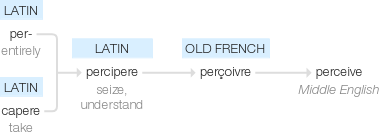Perceive
Middle English: from a variant of Old French perçoivre, from Latin percipere ‘seize, understand’, from per- ‘entirely’ + capere ‘take’.
wiktionary
From Middle English perceiven, borrowed from Old French percevoir, perceveir, from Latin percipiō, past participle perceptus(“take hold of, obtain, receive, observe”), from per(“by, through”) + capiō(“to take”); see capable. Compare conceive, deceive, receive.
etymonline
perceive (v.)
c. 1300, perceiven, "become aware of, gain knowledge of," especially "to come to know by direct experience," via Anglo-French parceif, Old North French *perceivre (Old French perçoivre) "perceive, notice, see; recognize, understand," from Latin percipere "obtain, gather, seize entirely, take possession of," also, figuratively, "to grasp with the mind, learn, comprehend," literally "to take entirely," from per "thoroughly" (see per) + capere "to grasp, take," from PIE root *kap- "to grasp."
Replaced Old English ongietan. Both the Latin senses were in Old French, though the primary sense of Modern French percevoir is literal, "to receive, collect" (rents, taxes, etc.), while English uses the word almost always in the metaphorical sense. Related: Perceived; perceiving.
